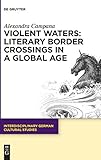Violent Waters: Literary Border Crossings in a Global Age / Alexandra Campana.
Material type: TextSeries: Interdisciplinary German Cultural Studies ; 27Publisher: Berlin ; Boston : De Gruyter, [2020]Copyright date: ©2020Description: 1 online resource (VIII, 274 p.)Content type:
TextSeries: Interdisciplinary German Cultural Studies ; 27Publisher: Berlin ; Boston : De Gruyter, [2020]Copyright date: ©2020Description: 1 online resource (VIII, 274 p.)Content type: - 9783110673562
- 9783110678635
- 9783110678604
- 809.933552 23
- PN56.B74
- online - DeGruyter
- Issued also in print.
| Item type | Current library | Call number | URL | Status | Notes | Barcode | |
|---|---|---|---|---|---|---|---|
 eBook
eBook
|
Biblioteca "Angelicum" Pont. Univ. S.Tommaso d'Aquino Nuvola online | online - DeGruyter (Browse shelf(Opens below)) | Online access | Not for loan (Accesso limitato) | Accesso per gli utenti autorizzati / Access for authorized users | (dgr)9783110678604 |
Browsing Biblioteca "Angelicum" Pont. Univ. S.Tommaso d'Aquino shelves, Shelving location: Nuvola online Close shelf browser (Hides shelf browser)

|

|

|

|

|

|

|
||
| online - DeGruyter Defining Orphism : The Beliefs, the ›teletae‹ and the Writings / | online - DeGruyter Relativsätze im Mittelniederdeutschen : Korpuslinguistische Untersuchungen zu Struktur und Gebrauch / | online - DeGruyter Sämtliche Werke. Band 5, Adlersflügel, Ehren-Stern, Leopoldus, Hochzeits- und Glückwunschgedichte / | online - DeGruyter Violent Waters: Literary Border Crossings in a Global Age / | online - DeGruyter Haunted Spaces in Twenty-First Century British Nature Writing / | online - DeGruyter Living with the Land : Rural and Agricultural Actors in Twentieth-Century Europe – A Handbook / | online - DeGruyter Entscheidungen in Kirchensachen seit 1946. Band 69, 1.1.2017-30.6.2017 / |
Diss. Vanderbilt 2014.
Frontmatter -- Acknowledgments -- Contents -- Introduction: Water and Unicorns. On Contemporary Fiction -- Chapter 1. Migration. Moving through Images and Words: Herta Müller’s The Passport (Der Mensch ist ein großer Fasan auf der Welt, 1986) and Gish Jen’s Typical American (1991) -- Chapter 2. Intercultural Dialogue. Communication across Space and Time in the New Millennium: Hugo Loetscher’s The Mandarin’s Eyes (Die Augen des Mandarin, 1999) -- Chapter 3. Defining the Self. Identity Formation in a Post-colonial World: Martin R. Dean’s My Fathers (Meine Väter, 2003) and Habib Tengour’s This Particular Tartar 2 (Besagter Tatar 2 / Ce Tatar-là 2, 1997–1998) -- Chapter 4. Invasion. Religion, War, and the Politics of Narration: Ian McEwan’s Saturday (2005) -- Conclusion -- Bibliography -- Index
restricted access online access with authorization star
http://purl.org/coar/access_right/c_16ec
The experience of witnessing and undertaking border crossings has become a pillar of the contemporary human condition. In order to respond to our global, multidimensional social reality, writers need to generate innovative forms of narration that expand the confines of literary tradition. This study discusses four types of border crossing (migration, intercultural dialogue, multicultural identities, military invasion) and presents literary aesthetics that unfold in Algeria, China, France, Germany, Romania, Switzerland, Trinidad and Tobago, the UK, and the USA. These analyses move from the fall of the Iron Curtain to the rise of the internet, and from the turn of the millennium to the terrorist attacks of 9/11, and the wars in Afghanistan and Iraq. Positioned in the field of comparative literature, this book draws upon an extensive background of theoretical thought (e.g. Adorno/Horkheimer, Arendt, Dawkins, Fanon, Freud, Kristeva, Žižek) and reaches into other academic disciplines (such as religious studies). Border crossings thus serve as both theme and methodology, which not only leads to a new definition of post-modern writing, but also underlines literature's relevance in a global society driven by public discourse.
Issued also in print.
Mode of access: Internet via World Wide Web.
In English.
Description based on online resource; title from PDF title page (publisher's Web site, viewed 25. Jun 2024)


